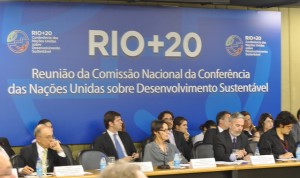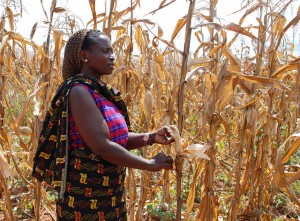The Rio+20 Summit has been generating lots of buzz lately, although the international meeting is not until this summer. Fellow bloggers Julia and Katherine have discussed, at different lengths, the history and preparation of this year’s summit. There are seven key categories up for discussion during the three-day event: Jobs, energy,  cities, food, water, oceans, and disasters. I propose that there is a crucial area of discussion missing from the conversation, and that is the piece of the puzzle where women belong in long-term environmental sustainability issues. Twenty years ago, at the conclusion of the first Rio Summit, members concluded that women have a “vital role” to play in managing and developing the environment, which requires them to participate to the fullest extent in order to achieve developmental sustainability.
cities, food, water, oceans, and disasters. I propose that there is a crucial area of discussion missing from the conversation, and that is the piece of the puzzle where women belong in long-term environmental sustainability issues. Twenty years ago, at the conclusion of the first Rio Summit, members concluded that women have a “vital role” to play in managing and developing the environment, which requires them to participate to the fullest extent in order to achieve developmental sustainability.
This meeting will be an important first step towards the design of the development framework in a world after the Millennium Development Goals have expired. Why, then, were issues concerning girls and women left out of the outcomes Zero Draft? Lakshmi Puri, Deputy Executive Director of UN Women has also spoken up, like many other leaders of female-focused organizations and initiatives to comment that “there is a need to better reflect and strengthen references to gender equality and women’s empowerment in the entire text of the Outcome Document.”
Many economic experts have testified to the fact that women play a huge role in the economic environment, through the formal, and especially in the informal economy, where they play a huge role in the informal agricultural sector worldwide, including Sub-Saharan Africa, East Asia, South Asia and Southeast Asia, and Latin America. The informal economy is largely characterized by and made up of people who are not on any  official payroll and are generally self-employed, such as some farmers and vendors. The role of women in the informal agricultural economy should be an obvious reason to take into consideration the role of women and jobs. In case it isn’t obvious, however, the Food and Agriculture Organization (FAO) has reported that results of some studies find that agricultural output in Sub-Saharan Africa could increase by as much as 20 percent if gender inequalities were overhauled. Finally, the World Bank has also indicated that several steps are necessary to repair gender equality and development, by addressing certain key priority areas, such as closing gender gaps in human endowments, promoting women’s access to economic opportunity, closing gender gaps in voice and agency, among other things.
official payroll and are generally self-employed, such as some farmers and vendors. The role of women in the informal agricultural economy should be an obvious reason to take into consideration the role of women and jobs. In case it isn’t obvious, however, the Food and Agriculture Organization (FAO) has reported that results of some studies find that agricultural output in Sub-Saharan Africa could increase by as much as 20 percent if gender inequalities were overhauled. Finally, the World Bank has also indicated that several steps are necessary to repair gender equality and development, by addressing certain key priority areas, such as closing gender gaps in human endowments, promoting women’s access to economic opportunity, closing gender gaps in voice and agency, among other things.
Because closing the gender gap in the jobs sector is crucial to further and sustained development, it is also extremely important to continue to invest in education, enforced rule of law for ownership and resource rights and access, and to promote greater decision-making and political representation of women. These issues are all explicitly or implicitly tied to the current Millennium Development Goals for 2015 and will without a doubt be similarly linked to the anticipated Sustainable Development Goals which will come into existence soon after. Currently, women make up only 1 percent of landowners all over the world, despite playing such a major role in agricultural employment. Including gender as part of the discussion at Rio+20 will allow for the specific inclusion of women to have more rights, equal rights, in land ownership and other issues regarding governance and rule of law. It would also allow for women to cultivate their land, and cultivate greater opportunities, for themselves, their families, and their communities. It would decrease poverty and increase health.
Indeed, planning for sustainable development, and progress of any kind, must account for equality between the sexes, as women share a greater proportion of many burdens of poverty, disaster, and disease worldwide. By addressing education and other inalienable rights, women will be more likely to succeed, and when women succeed, so do their families. This has been well documented by the World Bank as well, including in their 2012 World Development Report. In short, when women have access to education, they have better health outcomes for themselves, which in concert with increased knowledge ultimately leads to better health outcomes for their children. Women are more likely than men to invest in their own communities and invest their finances in family needs, such as healthier foods, education, and medicines. Again, the health of women and children are explicit goals for 2015, and will be targets for improvement in the new development framework.
More information on the inclusion of gender and women in the Rio+20 Summit is available here.



2 pings